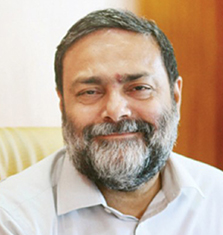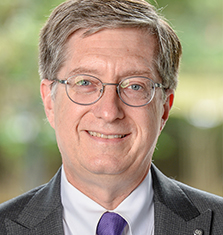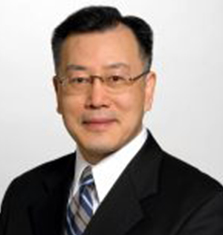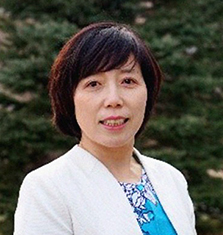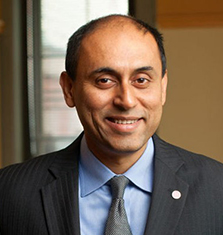Gain the knowledge and confidence to successfully chart a course of success for your academic institution in the post COVID world.
Learn and interact through live online classes with world class faculty from top universities.
Cornell University, USA
Goa University, India
New York University, USA
Stanford University, USA

- 16 Live Virtual Sessions
Over 2 months - 5 Interactive Modules
Taught by Top Global Faculty - Dedicated Group Coach
With Active Group Work
Leading Academic Institutions in Turbulent Times: Building for a post Covid-19 future
Gain the knowledge and confidence to successfully chart a course of success for your academic institution in the post COVID world.
Learn and interact through live online classes with world class faculty from
| Cornell University, USA | Goa University, India |
| New York University, USA | Stanford University, USA |
- A program designed to build leaders who build academic institutions.
- Connecting you to the best experience of academic leaders worldwide.
- Delivered via live virtual teaching on the Igesia learning platform.
- Integrated with group work on real world projects.
About the Program
The COVID-19 pandemic has proven to be a key tipping point for academic institutions. Change has come suddenly and forcefully in multiple ways. Institutions have been forced to move their teaching programs online in a rush. Financial pressures have been accentuated and academic leaders are now forced to consider aggressive measures to contain costs and survive the crisis. The future has certainly become much more uncertain and volatile than before.
However, with every crisis comes opportunity. It has become clear that academic institutions will have to change significantly along multiple dimensions to thrive in the new normal of a post-Covid world. Digitalization will now become part of the core and academic learning and program design will have to be rethought. Careful attention will have to be paid to enhancing the student experience and ensuring that value delivery is concrete, timely and relevant to future career aspirations. Relationships with industry will have to be developed and faculty will have to be encouraged to broaden their perspectives and engage more with government, business and society.
Succeeding in this rapidly changing world will require both a solid understanding of global trends influencing academia and an inspirational leadership style to be bold, take risks and lead complex change.
What you will learn
The goal of this program is to provide academic leaders with an effective understanding of the current pressures for change in academia and provide the tools for charting a course for success in the future. Interactions with experienced Deans and Directors from India and abroad will highlight best practices and provide insights along the following important dimensions:
Thriving in a VUCA world
World has become more volatile, uncertain, complex and ambiguous for academic institutions. Deans and directors need to understand the forces of change and learn the basics of scenario planning to chart strategies for the future.
Blend Design thinking with Disruptive Technologies
The role of faculty and the nature of student success will have to be carefully reconsidered. New thinking on teaching and research and the impact of digital technologies on these important functions will lead to novel business models for academic institutions.
Connecting to the external ecosystem
Academic institutions will need to be increasingly connected to key players in the external ecosystem – governments, businesses and civil society. Academic leaders will need to build new connections and orchestrate different parties to help advance the agendas for advancing the goals of their own institutions and of the ecosystems in which they exist.
Upon completion of the program, you will be ready to apply your knowledge to lead strategic change for your academic institution in a VUCA post-Covid world.
World Class Faculty
You will learn from world class faculty in this program from leading business schools and global corporates.
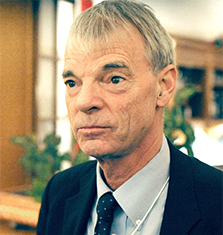
Professor Michael Spence
Nobel prize winner for economics in 2001, together with George Akerlof and Joseph Stiglitz for their analyses of markets with asymmetric information, Michael Spence is senior professor at the Department of Economics at Bocconi University and professor in the MBA program at SDA Bocconi.In 1981 he was awarded the John Bates Clark Medal from the American Economic Association.
Spence is also Professor in Economics & Business at the New York University Stern School of Business and Professor and Dean, Emeritus, at the Graduate School of Business, Stanford University. Michael Spence is currently a senior fellow at the Hoover Institution, serves as co-chair with Joseph Stiglitz of the Commission on Global Economic Transformation and is Senior Advisor at General Atlantic and a Senior Advisor at Jasper Ridge Partners.
He is the co-chair with Dr. Victor Fung, of the Advisory Board of the Asia Global Institute at Hong Kong University. Spence serves on the Advisory Board of the School of Economics and Management at Tsinghua University in Beijing. Spence chaired a global Commission on Growth and Development (2006-2010), addressed to growth issues in emerging economies.
Hon’ble Vice Chancellor Professor Varun Sahni
Varun Sahni is Vice-Chancellor, Goa University. He is also Professor in International Politics at Jawaharlal Nehru University, New Delhi (currently on deputation leave). He speaks annually (since 2006) at the National Defence College (NDC) and several times a year (since 1997) at the Foreign Service Institute, New Delhi.
He has been a Jury Member of the Jawaharlal Nehru Award for International Understanding..He has been a Jury Member of the Jawaharlal Nehru Award for International Understanding.An Inlaks Scholar, he wrote his doctoral dissertation on the political role of the Argentine Navy at the University of Oxford (1991). He has written 105 research articles on nuclear deterrence issues, regional security, emerging balances in the Asia-Pacific, evolving security concepts, emerging powers, international relations theory and Latin American issues.
He has recently co-authored Technology Vision 2035 for TIFAC, the technology think tank of Government of India. Professor Sahni has been visiting professor at important universities in Mexico City, Washington, DC and Canberra. For his “outstanding contribution to research and teaching”, he was conferred the V.K.R.V. Rao Prize in Social Sciences for 2006 by the Indian Council of Social Science Research. From December 2008 to January 2012, he served as the 10th Vice-Chancellor of the University of Jammu.
Hon’ble Vice Chancellor Professor Jeffrey Sean Lehman
Jeffrey Sean Lehman, a scholar, lawyer, and academic administrator, is the vice chancellor of New York University Shanghai. Known as an advocate for the role of universities in globalization.
He has served as chancellor and founding dean of the Peking University School of Transnational Law in Shenzhen, China, as the eleventh president of Cornell University and as dean of the University of Michigan Law School.In 2018, he was named one of the 40 most influential foreign experts in China and was awarded the Friendship Award, China’s highest honor for “foreign experts who have made outstanding contributions to the country’s economic and social progress.”
Vice Chancellor Lehman received an undergraduate degree in mathematics from Cornell University, an M.P.P. from the University of Michigan, and a J.D. from the University of Michigan Law School.Throughout his professional and academic career, Lehman has volunteered his time and energy to non-profit organizations that share his commitments in the fields of higher education, law, and technology.
Dr. Dongmin Chen
Dr. Dongmin Chen is the Dean of School of Innovation and Entrepreneurship, Director of Science and Technology Development Office of Peking University, and a tenured full professor in the Faculty of Academy for Advanced Interdisciplinary Studies.Dr. Chen is the International Adviser of WIPO GII.
He is a serial entrepreneur and invented the Metal Oxide Heterojunction RRAM device and led the technology development for MEMS-CMOS 3D integration.He has developed more than 100 international patents. He has co-authored more than 70 scientific publications and 150 US and international patents. Dr. Chen is an Associate Editor and board member of Applied Physics Journal; a Sr. Associate Editor of Chinese Science Bulletin and an Associate Editor of Chinese Physics Letter. He is the Honorary Advisor to the Chinese American Semiconductor Professional Association in the US.
Professor Alice Li
Alice Li is the Executive Director of the Center for Technology Licensing (CTL) at Cornell University. She oversees all aspects of technology management, marketing, license negotiation, outreach, and CTL activities to facilitate new venture creation in its services to all Cornell campuses and colleges.Alice has 14 years of experience in university technology transfer.
She was the Director of Licensing of the Ithaca office from 2011 to 2014, providing mentorship for licensing professionals in intellectual property protection, license negotiation, and spearheading new commercialization initiatives. Alice joined CTL in 2002 and started with hands-on management of invention portfolios, negotiations of complex deals, and engagement with start-up companies.
Alice obtained her Ph.D. from Cornell University and a B.S. from Tsinghua University. She is also an inventor and patent holder. Alice has been a Certified Licensing Professional since 2010.
Professor Soumitra Dutta
Soumitra Dutta is a Professor of Management at and the former founding dean of the SC Johnson College of Business at Cornell University, New York. He is the founder of the Global Innovation Index, published by the World Intellectual Property Organization.
He was the co-editor of the Global Information Technology Report, published by the World Economic Forum – two influential reports in technology and innovation policy.He is also the founder and President of Portulans Institute, a non-partisan nonprofit research and education institution based in Washington DC.Dutta is on the global boards of Sodexo and Dassault Systemes. He is also a member of the Shareholder Council of Chicago-based healthcare consulting company ZS Associates. Dutta is a member of the Davos Circle, an association of long-time participants in the Annual Davos meeting of the World Economic Forum. He was the co-chair of the World Economic Forum’s Global Future Council on Innovation Ecosystems. He is also the Chief Academic Advisor to the Artificial Intelligence Forum of the Confederation of Indian Industry).
Your Learning Journey
During the program you will have the chance to learn from world class faculty through live virtual lectures . You will interact with industry executives and better understand ongoing global trends. You will be given the opportunity to work in groups on projects of relevance to your business contexts.
Who should take this course?
This program is designed for a broad range of Deans and Directors of academic institutions including universities and colleges – both public and private. Department heads, program deans, college principals and university vice-chancellors will benefit from the content of the program and learn to effectively analyze, articulate and apply key management and leadership insights in their home institutions.
This program will benefit you if
- You are seeking to understand the forces of change creating a VUCA world for academic institutions
- You want to charge an effective strategic direction for your institution to thrive in a post-Covid world
- You wish to understand best practices in academic leadership from both India and abroad
- You wish to identify emerging trends and new business models for academic institutions.
- You seek to drive change in your organization and provide leadership to your faculty, students and staff to succeed in a new post-covid world
- You wish to understand your own leadership style and become more effective as a leader

